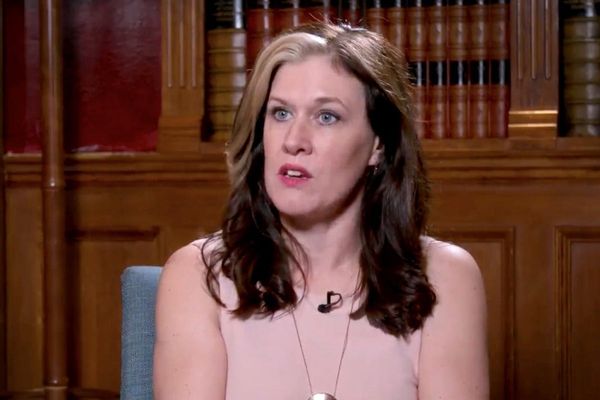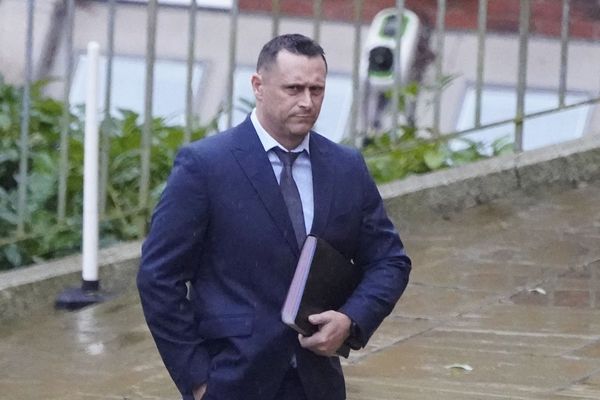Each morning before dawn, Mohamad Kreiydye bids silent farewell to his sleeping family and begins the day's hunt for fuel.
From his neighbourhood in central Beirut, he weaves his taxi through the city's deserted streets to a local petrol station where a queue of cars has been forming overnight.
Around him, the skyline and buildings are dark, save for the occasional flickering of an advertisement billboard.
Beirut, the sprawling capital that was once known as the Paris of the Middle East, was for a long time a financial and cultural centre in the region.
Its waterfront cafes, bars and Mediterranean lifestyle were havens for a thriving Lebanese counter-culture and curious tourists alike.
But today, the lingering scars of a brutal civil war, decades of terminal leadership, ongoing economic ruin, a global pandemic and the catastrophic explosion of a cache of ammonium nitrate that killed more than 200 people last August, have left the city battered.
Mr Kreiydye spends up to four hours each morning in the fuel queue, waiting to fill his tank so that he can begin his work ferrying passengers around the Lebanese capital.
Although he would rather sometimes sleep, resting for too long means other drivers will cut in front of him in the queue and he will be forced to waste more of the day.
"It is chaotic," he said.
It's only when Mr Kreiydye finally reaches the fuel pump that the knot in his chest relaxes and he catches himself smiling in the rear-view mirror.
"I would have never thought I'd be happy someday just to fill up my car with petrol," he said.
Long queues for fuel are a symptom of an unfolding economic crisis that has racked Lebanon since 2019 but had been fomenting long before that.
"Lebanon is going through one of its most existential crises," Lebanese economist Alia Moubayed said.
A confluence of crises in its banking sector, government and currency have spilled in the last few years into a wider social and economic catastrophe with far-reaching implications.
Lebanon's descent into ruin
Lebanon's crisis is largely a result of decades of corruption, waste and mismanagement, with previous governments having spent vast sums of money, leaving the country deeply in debt with little to show for their efforts.
Some economists have described the country's financial system as a nationally regulated Ponzi scheme, because it relied on fresh borrowing to pay back existing debt, Reuters reports.
Last year, Lebanon defaulted on paying back its debt for the first time in its history and the local currency lost more than 85 per cent of its value.
Since then, a free-falling Lebanese pound has wiped out savings and made it nearly impossible for everyday people to pay for basic goods.
Tens of thousands have lost their jobs and nearly half the country’s 5 million people live in poverty.
The situation is considered so dire that the World Bank believes Lebanon's economic crisis could possibly rank in the top three most severe anywhere in the world since the 1850s.
All across the country, food, fuel and medicines are in short supply, while a crippled electricity grid and network of privately-owned generators provide just a few hours' power to households each day.
"I still have the same income. That's not the issue," says Mr Kreiydye, who lives with his wife and two school-aged children in the Corniche El Mazraa neighbourhood.
"The huge difference lies in [rising prices]."
The situation has become so dire that his family has become vegetarian by necessity — they've cut meat out of their diet to save money.
What previously would have cost him just a small portion of his earnings, can now run into the millions of pounds. A major repair for his taxi could push him into financial ruin.
"Our family used to plan one month in advance," he said.
"Sometimes now we live hour by hour because we cannot plan anymore."
Among Lebanese people, there is a fiery resentment towards the country's ruling class, which they accuse of rampant corruption and neglect.
"This country is a paradise but nobody is succeeding to manage it," said Jihad El Joundi, a 51-year-old metalworker from the working-class Badawi neighbourhood in Beirut's centre.
"On the contrary, we are going backwards."
The mighty US dollar is king in the black market
The decision to permanently peg the Lebanese pound to the US dollar in 1997 has resulted in a bizarre situation some 20 years later.
In the midst of a collapsing economy in 2021, Lebanon now has two parallel exchange rates.
When paying by bank card inside shops or withdrawing from ATMs, $US1 is worth 1,500 Lebanese pounds — according to the official exchange rate.
But on the streets, from black market cash merchants who will deliver to anywhere in Beirut for a fee, $US1 can buy 10 times that amount in pounds, often more as the value of the pound continues to plummet.
"Basically, you can say the currency has lost almost all its value," Ms Moubayed said.
"With a big amount of money, you cannot buy anything anymore," Mr El Joundi said.
"It is very hard to earn one's living. We work very hard for very little."
The state's failure to provide secure electricity, healthcare and stability has created fertile grounds for profiteering to spring up.
Family living abroad begged to bring suitcases with supplies
Few parts of the economy are as vulnerable to the deepening crisis as the country's healthcare system.
Hospitals across the country are battling with shortages of key medicines, power blackouts throughout much of the day, as well as now a global pandemic and a vaccination rate hovering at just over a tenth of the population.
At some hospitals, staff ask patients to source their own drugs for their treatment, forcing families to travel from hospital to hospital, cap in hand, seeking medicine for their loved ones.
The drug shortages have driven Lebanese living abroad to bring with them suitcases laden with medical supplies for their families, who cannot source them in Lebanon's depleted pharmacies.
"Is someone going to arrive in Beirut from Paris today or tomorrow? Urgent need for medication," read one Facebook post in a group of Lebanese expats in France.
"Unfortunately, this is becoming very common in Lebanon," said Dr Firass Abiad, the managing director of Rafik Hariri University Hospital, the largest public hospital in Beirut.
An exodus of medical professionals from Lebanon since 2019, according to Dr Abiad, has further weakened an already crumbling healthcare system.
"I think after the blast, [medical staff] got very demoralised and a lot of people have lost hope."
As many flee, those that remain fear for the future
For many Lebanese, watching their country spiral into economic collapse has underscored mixed feelings of fury and total helplessness.
Some have made the difficult decision to leave to seek opportunities abroad, a situation which the World Bank views as only worsening the country's social and economic loss.
"We've been through many wars in Lebanon, but we've never reached this low," said Fatme Ghaddar, a 31-year-old mother of three.
Ms Ghaddar's family relies on the meagre earnings of her husband, who works part-time at a bakery in Beirut.
She has no access to reliable electricity to refrigerate food in their tiny fourth-floor apartment in the poor Khandak El Ghamik neighbourhood.
At night, she and her sons barely sleep in the sweltering summer heat while her husband lays on a mattress by the front door, unable to power fans. Air conditioning is considered an unthinkable luxury.
Ms Ghaddar believes the desperation of many to make ends meet has pitted many Lebanese against each other.
"Nobody cares about one another, there is no one to turn to for help. There is no state, no president," she said.
The crisis is having a toll on her mental health — during the day, she feels despondent, her face ashen, trying to minimise time outside of the apartment to reduce her exposure to COVID-19 infection.
Even so, she does not think of moving her family abroad, like so many in Beirut talk of doing.
"Lebanon is my country. Even if I have to, I will never leave my country," she said.







